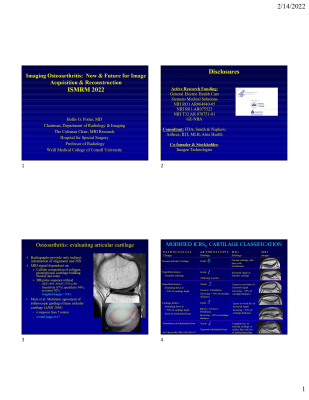Sunrise Course
Acquisition & Analysis in Context: Musculoskeletal Image Acquisition & Reconstruction
Joint Annual Meeting ISMRM-ESMRMB & ISMRT 31st Annual Meeting • 07-12 May 2022 • London, UK

| 08:00 | Rapid Musculoskeletal Imaging and Machine Learning: Acquisition, Reconstruction & Analysis
Akshay Chaudhari
Machine learning has enabled several advances for acceleration of MRI sequences along with the automated analysis of arbitrarily reconstructed images. This first portion of this lecture will focus on summarizing the major families of machine learning techniques applied towards undersampled image reconstruction tasks as well as the automation of classification, segmentation, and detection tasks. Since machine learning advances are strongly coupled to publicly available datasets, the second portion of this lecture will compare and contrast current public MRI data repositories relevant for musculoskeletal MRI.
|
||
| 08:30 |  |
Imaging Osteoarthritis: Now & Future for Image Acquisition & Reconstruction?
Hollis Potter
Quantitative MRI of cartilage provides objective assessment of both collagen orientation and proteoglycan content. Ultrashort TE sequences provide robust assessment of collagen orientation in fibrocartilage such as the labrum and meniscus, as well as ligament and tendon collagen integrity. Quantitative MR techniques have shown to be reproducible across sites and have been correlated to altered gait mechanics. Voxel-based relaxometry allows for more facile assessment of longitudinal change, and the addition of convolutional neural networks permit assessment of large, curated databases to detect variables that lead to disease progression. Lastly, weightbearing assessment allows for determination of cartilage mechanics and scrutiny of surgical interventions aimed at delaying osteoarthritis progression.
|
The International Society for Magnetic Resonance in Medicine is accredited by the Accreditation Council for Continuing Medical Education to provide continuing medical education for physicians.